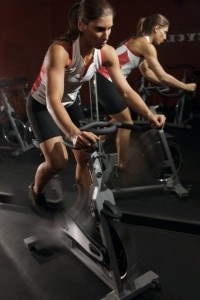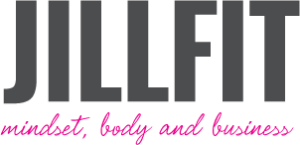You Can’t Out-Train A Bad Diet <— There you go! And this article investigates why.
I admit, I usually have to SMH when I see magazines that print calculation charts to represent just how many minutes of cardio you need to do to burn off a specific food item. Bacon cheeseburger? 561 minutes on the stair master! Kill me now. Lol. IMO, the most useful part of these articles is the fact that they scare the crap out of you by showing you just how many calories are actually in some of the sweets and treats we eat. But, in general, I feel they do us a disservice when they treat the body like a simple furnace: calories in vs. calories out. We all know that it is not nearly that simple–we’ve all experienced it to be more complex than that. I know I have.
Do calories matter? Absolutely. But they are not the end of the story. To say that you can eat 1600 calories’ worth of pizza and then go burn off 1600 calories by doing 2 hours of cardio and you will look the exact same, is absurd. It is not only the amount of food, but also the quality of the foods you eat that matters. Someone eating 1600 calories’ worth of lean chicken breasts looks a lot different than someone getting those same cals from donuts, even if both people burned the same number of calories from exercise.
Still not convinced? Here are my 6 reasons to stop killing yourself with exercise just to have a couple extra bites of dessert:
1) Dietary changes are much more powerful for weight loss than exercise.
Exercise cannot be your #1 tool for fat loss, simply because it does not impact the metabolism as much as diet does. In my early 20s, I tried, optimistically (lol), to exercise off my disgusting weekend’s worth of Bud Lights, frozen pizzas and bagels and though I was burning tons of calories, I never looked any different. BUT, there is an important point to be made here about weight maintenance: exercise has a great track record when it comes to helping us maintain our weight loss. However, in terms of attainment, several studies demonstrate that groups who only made dietary changes lost nearly as much weight as those who dieted and exercised. The difference is a few mere pounds. Nutrition is the gross control for weight loss, while exercise is the fine control. Weight-training exercise in particular is useful because it helps shape the physique, adding curves and preserving muscle. It assures that when we lose weight, we are losing fat and not muscle. If you have to choose between spending your time at the gym for hours or at home prepping food, choose the latter. Use your mental energy & willpower in the nutrition realm for best results.
2) MODES of exercise have different impacts on the physique via hormones.
When we assume the body is a calories in vs. calories out furnace, we assume that the mode of exercise is irrelevant, so long as we are burning calories. However, the missing piece to this is that weight training impacts hormones differently than cardio, and can create a different “look.” Intense weight training increases testosterone, growth hormone and lactate, all of which impact muscle synthesis and fat burning. Doing cardio alone to burn cals can impact fat loss, but it takes some muscle along with it. Learn to work smarter, not harder. Weight training trumps cardio for fat loss. Intensity trumps duration for fat loss.
3) The quality of the physique changes when you eat crap and try to exercise it off.
When you eat lots of fatty, sugary, salty treats and then do penance in the gym burning up the same amount of calories consumed, the affect on the physique is not simply canceled out. It creates a different effect than if you had eaten clean but then also skipped cardio. In other words, the “eat more, cardio more” look is different than the “eat less, do less” look. The former tends to look puffier, may retain water more, may be more inflamed, have a hard time getting cuts & definition to come out, or not look as dry or “hard.” These differences are subtle and most-easily seen on stage with competitors who simply tried to cardio their way to the stage versus those competitors who simply kept their diets clean as a whistle.
4) Adding more and more volume to your exercise is unsustainable and damages your metabolism further.
This goes back to exercise resistance and the cardio cycle. When you use exercise as your primary tool for fat loss, the more exercise you do, the more you have to continue to do to stay the same size. A study came out a couple years ago that showed that for distance runners, they had to increase their mileage by a certain percent each successive year just to maintain their weight. Ugh. In short, that kind of volume is simply unsustainable, but at that point, you are caught up in a cycle where your body expects a certain amount (is operating at a certain volume) or else you gain. Not fun. Breaking the cycle takes time and strategy. Not to mention, your metabolism becomes less and less responsive the more up and down your weight fluctuates.
5) More exercise increases hunger and cravings–putting you in a cycle of eating more, then having to exercise more.
Long-duration cardio increase the hunger hormone ghrelin. You’ve heard this before: when you bump up your exercise, you want to eat more. You are actually physically more hungry, plus exercise increases neurotransmitter release (dopamine, serotonin, etc), which, over the long-haul, if they are depleted, can have a severe impact on cravings. Exercise is an appetite stimulator; especially the long-duration variety. Choose short-duration, high-intensity cardio when possible, 30 minutes or less, 2-4x/week.
6) The whole concept of “doing penance” because of bad food choices puts us in a negative frame of mind, where we use guilt and remorse as motivation. The idea that we owe a certain number of minutes to the stairmaster because we’ve been bad simply perpetuates the black-and-white/on-or-off dieting mindset. This does not serve us in the long run, in terms of sustainable fat loss. Don’t allow food to have that kind of control over you. Instead, learn to understand your metabolism, and tune into your hunger and cravings signals so you can be more prepared in the future. Guilt as motivation to clean up our acts ultimately leaves us less motivated and more frustrated.
Related: 4 Cardio Myths



